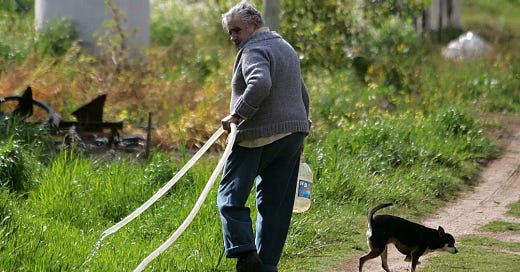Former president of Uruguay, ex-guerilla with the Movimiento de Liberación Nacional – Tupamaros and chrysanthemum cultivator José “Pepe” Mujica has died, aged 89 years.
Though I have only visited it once, that single trip 15 years ago was enough to convince me that Uruguay is really one of the world’s undiscovered paradises. A stable democracy that alternates peacefully between centre-left and centre-right; rolling plains interspersed with rivers and a glistening coastline; mate to drink and good food to eat; fluid and clear Spanish and notably pretty people. A place that could have all that and somehow manage to produce both the Comte de Lautréamont, né Isidore Lucien Ducasse, author of the transgressive prose poem Les Chants de Maldoror, and one of the world’s most effective national football teams must have something going for it, something desirable and intangible in the air.
While he was president, from 2010 to 2015, Pepe Mujica made it even more so. It was during his presidency that abortion was decriminalized in Uruguay and women became able to control their own reproductive rights. Same sex marriage was legalized, as was the production, distribution, and sale of cannabis. The Universidad Tecnológica del Uruguay - the country’s second public university - was created and a wide-ranging plan was launched to provide low-income families with access to decent housing. He ran a humane government in a humane country, all the more extraordinary when one considers he did so without apparently even a trace of bitterness despite being imprisoned for more than a decade, repeatedly tortured and held for two years at the bottom of cistern by the country’s 1973 to 1985 dictatorship. In an era when we seem confronted with professional victims of every stripe, Pepe Mujica saw some of the worst that humanity had to offer and still managed to emerge with empathy for his fellow human beings.
As vainglorious caudillos build ostentatious tributes to themselves around the world, he continued to live on his small farm with his wife Lucía Topolansky (herself an extremely impressive person), a 1987 Volkswagen and a three-legged dog named Manuela. He appeared genuinely unmoved by the trappings of power, saying at one point
The problem is that presidencies end up resembling monarchies. That red carpet, all the apparatus…[But] if the majority is the one who elects, then presidents have to live like the majority lives, not like the minority. They call me the poorest president, but I don't feel poor. The poor are those who work to try to maintain an expensive lifestyle and always want more and more. It's a question of freedom. If you don't have many possessions, you don't have to work like a slave your whole life to maintain them, and then you have more time for yourself.
I don’t do political hagiographies, even for those I greatly admire, and Mujica clearly also said some questionable things over the years. He was inexcusably slow in his condemnation of the depraved narco-kleptocracy that squats over Venezuela, an octopus-like orgy of criminality with the brutish Nicolás Maduro as defacto capo di tutti i capi and as rotten a regime as has ever existed in Latin America. In the midst of a failed attempt to oust Maduro from power in April 2019 during which government military vehicles were filmed running over protesters, Mujica - the former guerilla - opined “You shouldn't stand in front of tanks…If you go out on the streets, you expose yourself.” The following year, a 411-page report by United Nations investigators implicated the regime in systematic human rights abuses, including killings, torture and sexual violence, amounting to crimes against humanity. In March 2024, Mujica claimed that calling the Venezuelan regime a dictatorship was “misleading” and embarked on a long, odd digression about Afghanistan and Saudi Arabia before appearing to contradict himself by saying “what is clear is that in Venezuela there is no basic respect for the opposition, and that is disturbing and creates a situation where it cannot be called a democracy.”
But he could also speak plainly, breaking with even some of his more ideological allies in Uruguay’s left, and last autumn, in an interview with El Observador, he said clearly that “Nicaragua and Venezuela are indefensible as they are today….They play at democracy.”
He had a level of wry self-awareness rare among political leaders, telling El País last October “I dedicated myself to changing the world, and I didn't change a damn thing, but I was entertained and gave my life meaning. I will die happy. I spent my time dreaming, fighting, struggling.”
Who could ask for a more eloquent last testament?
“This is the tragedy of life, on the one hand it’s beautiful, but it ends,” Mujica told my friend Luis Andres Henao in a 2023 interview. “Therefore, paradise is here. As is hell.”
Speaking to a journalist from the Argentine newspaper Clarín last year, he summed up his philosophy:
Generosity is the best business.
You were for real, Pepe, auténtico, which is about the highest complement I can pay to someone involved in politics.
It is reported that José “Pepe” Mujica will be buried next to his dog, Manuela, who predeceased him, under the shade of a tree on his farm outside Montevideo.




